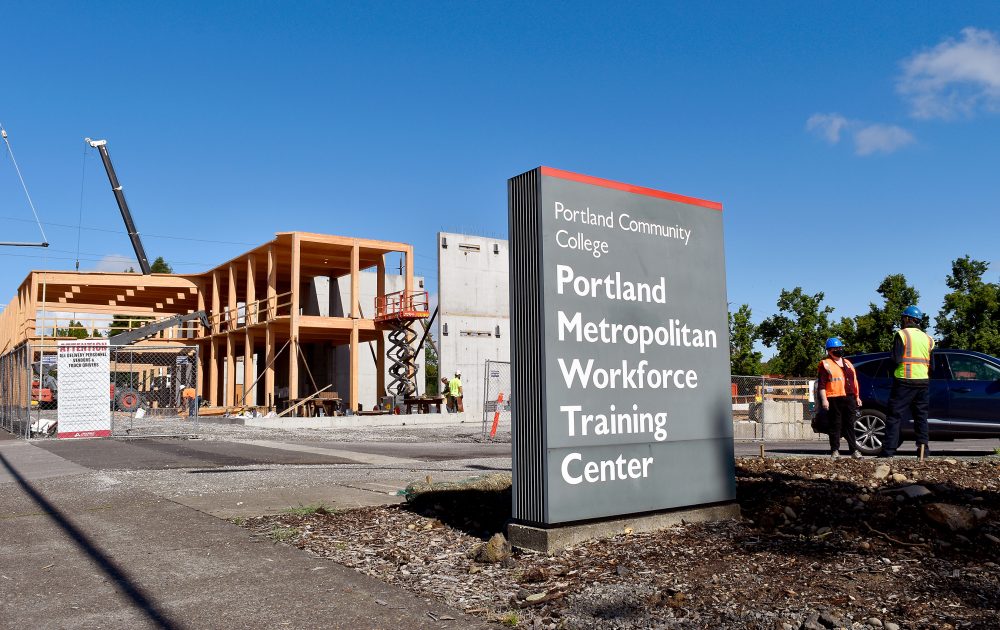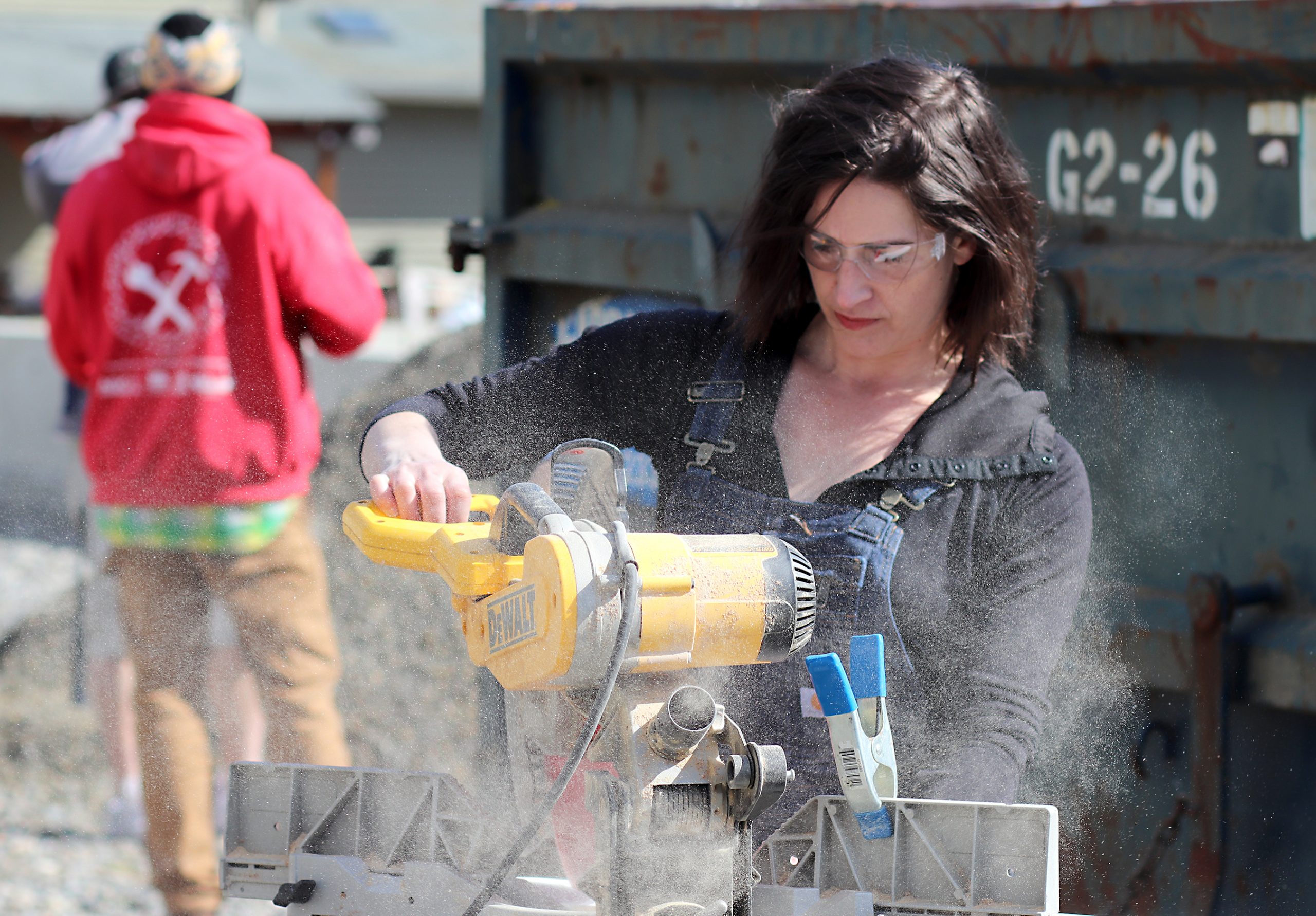This content was published: July 11, 2022. Phone numbers, email addresses, and other information may have changed.
Newest Opportunity Center will be an affordable housing hub
Story & Photos by PCC's Public Relations Office.

The Portland Metropolitan Workforce Training Center is under construction in the Cully neighborhood of Northeast Portland and will include 84 affordable housing units and other supportive services to the PCC and surrounding communities.
The Hope Center for College, Community, and Justice conducted a Real College Survey in March 2021 and the results were startling – 56% of Portland Community College students who responded to the survey experienced housing insecurity in the previous year, with 19% potentially experiencing homelessness and 5% self-identifying as homeless.
But PCC is taking action. The recently completed Facilities Plan helped the college develop a strategy to address the need for affordable housing, to identify potential housing sites on PCC locations, and to create criteria to balance future academic land use needs with other student support services. Recognizing that the college is not able to serve as a housing operator, PCC committed to strategic partnerships with housing providers who have the expertise and resources needed to handle the affordable housing on campus sites.
“Knowing that students with greater life stability have higher rates of college retention and graduation, PCC is now taking the steps to introduce community affordable housing at each of our campuses and the Portland Metropolitan Workforce Training Center,” explained Rebecca Ocken, interim director of PCC’s Planning & Capital Construction Office.
2022 PCC Bond Measure
PCC will be on the November 8, 2022, ballot. If passed, the $450 million bond measure is estimated to maintain current tax rates for local homeowners. The bond would …
- Update technology and equipment to provide students with modern higher education and job training opportunities. Upgrade classrooms and technology to provide more options for hybrid learning so students have the flexibility to balance school with transportation challenges, job schedules and family responsibilities.
- Expand access to education for people living with disabilities. Increase facility life span and efficiency through heating and cooling upgrades, and updated ventilation, plumbing and electrical.
- The college will pay off a bond debt in 2023, which provides the opportunity for PCC to go out for a new bond. The rate taxpayers pay would stay at $0.38 per thousand dollars of assessed home value. The bond will mature in approximately 16 years. (This is the date when the borrower repays the principal amount and interest). The taxpayer cost would be $95 per year or $7.92 per month for property with an asse- ssed value of $250,000. Assessed value is generally lower than market value.
The Portland Metropolitan Workforce Training Center (PMWTC)—currently under construction in the Cully neighborhood of Northeast Portland—is an excellent example of a project that will help solve the housing issue. PMWTC will include 84 affordable housing units and other supportive services to be accessed by surrounding communities. The college partnered with Home Forward to develop and manage the affordable housing community at this site, with substantial help from NAYA and Living Cully.
Jonathan Trutt, the director of development and community revitalization at Home Forward, finds PCC a wonderful partner because of the alignment of mission. Of their role in the PMWTC project, Trutt notes, “Housing is what we do and people are the reason it matters. Housing is just one piece of what’s needed to achieve people’s full potential.”
The affordable housing building, adjacent to the PMWTC, will feature larger units that can accommodate families with children, as well as roommates, and will have units set aside for families involved in the foster care system. Pam Hester, PCC’s regional director of Community Workforce Development, emphasized the importance of affordable housing on this project.
“Having Home Forward’s affordable housing community next door is central to providing the range of coordinated support that low-income folks need to achieve economic mobility,” she said.
The future PMWTC will be the site of PCC’s next Opportunity Center, where the college aims to create opportunities for people to transform their lives through education and careers.
“The center will aim to reverse racial and economic disparities by connecting people to skills training, wrap around support, and navigation/career coaching so they can succeed in education and career track employment,” Hester said. “At the center, PCC will offer a range of services to help people build skills and create education and career plans, and on-site partners will provide wrap-around support and guidance.”
The affordable housing units planned for PMWTC and on other PCC campuses in the future will be open to the community but heavily marketed to its students. Students who qualify will not lose housing if they are not enrolled in college. This is an important piece because PCC students, with an average age of 28 to 32 and often with families and jobs, are not always able to enroll in classes on a continual schedule. These affordable housing units will offer them and other community members the stable foundation they need to focus on their education and their careers. NAYA is partnering with Home Forward to provide case management services for 35% of the households in the Portland Metro WTC building.
In light of the community’s struggle with the economic effects of the pandemic where inequalities that existed prior to it have been exacerbated, the future center will help close opportunity gaps. The new facility replaces two outdated buildings from the 1950s and 1980s, giving community members a wide range of services and programs that will conveniently be under one roof. The project combines classrooms, meeting rooms, open workspace as well as a community room and common areas – all housed in a cutting-edge mass timber and mass plywood community-based facility.
Portland Metro WTC, which first opened its doors 25 years ago, works with community members who are receiving public assistance to gain skills needed for employment. The center’s employment and training programs help users develop and match their skills with family wage jobs.
“There is one thing we all need as we pursue individual career paths and that is meaningful support,” said Portland Mayor Ted Wheeler. “This is where Portland Community College steps in with its workforce training center. It’s about providing people with the support they need to be successful in whatever career path they choose. This new facility will help PCC to continue its good work in helping Portlanders develop career skills through both training and support. This program has been incredibly innovative and has been vital in creating a more equitable and accessible workforce in Portland.”
